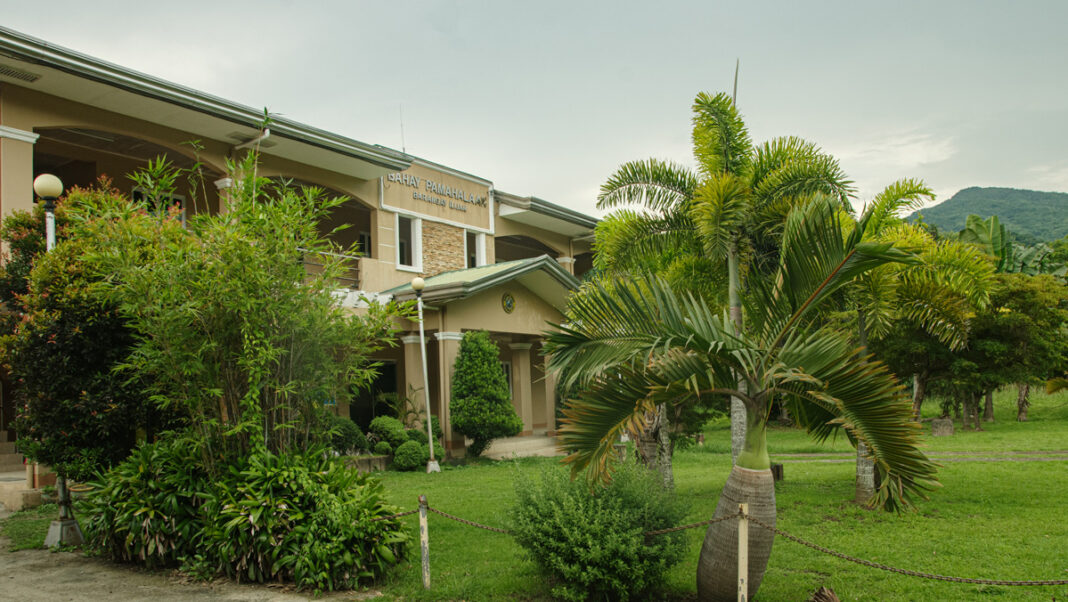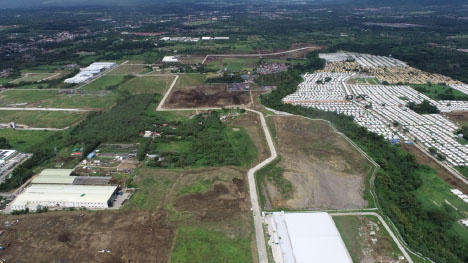By Elyssa Lopez, Philippine Center for Investigative Journalism
WELCOMING visitors to the main office of the Ilijan barangay hall is a monthly calendar written out on a whiteboard. On each square, there was the date of the month, a corresponding activity, and an official in charge.
On Sept. 6, 2022, Monday, when PCIJ visited the office, there were no activities or official’s name written out.
“Wala rin po si pangulo (Pangulo isn’t here),” said a staff member of the barangay. “Masakit daw ulo niya (He has a headache, he said).”
Pangulo or president in Filipino is how the Ilijan residents called their barangay chairman. Anytime a resident spoke about him, they would call him pangulo, indicating the kind of respect the residents gave to the leader of their barangay or village, Gilbert Cepillo.
The Philippine Center for Investigative Journalism (PCIJ) team visited Ilijan twice in the first week of September to get an interview with Cepillo. As the barangay chairman, he was part of the public consultations that representatives of Atlantic Gulf & Pacific Company (AG&P) conducted in the past two years in the community. AG&P subsidiary Linseed Field Corp. is the proponent of the soon-to-open liquified natural gas (LNG) import terminal facility in Ilijan.
Adjacent to the terminal site is the 1,700-megawatt combined cycle gas turbine power plant project of Excellent Energy Resources Inc. (EERI), a subsidiary of SMC Global Power Holdings Corp. The same firm owns and operates the Ilijan Power Plant, which has been in operation in the barangay since 2002. With the Malampaya gas field’s imminent depletion, SMC Global Power intends to purchase imported LNG to fuel the Ilijan Power Plant, according to news reports.
On the second time the team visited the barangay, a staff member reiterated that Cepillo was unavailable: “Ay, wala po siya. Naka-duty sa planta (Ay, he’s not here. He’s on duty at the plant).”
The same staff member said the chairman worked at least four days a week in the plant.
At least three sources interviewed by the PCIJ, all of whom were residents of the barangay, confirmed that Cepillo worked in the Ilijan Power Plant, the barangay’s largest private employer. Like many areas that host large facilities like mines, plants, and factories, residents are often part of the local workforce. One Ilijan resident told PCIJ that at least half of the power plant’s employees were locals.
Conflict of interest?
Under Republic Act 6713, or the Code of Conduct and Ethical Standards for Public Officials and Employees, public officials and employees are expected during their incumbency to not “own, control, manage or accept employment as officer, employee, consultant, counsel, broker, agent, trustee or nominee in any private enterprise regulated, supervised or licensed by their office unless expressly allowed by law.”
All businesses must secure a business permit from the city or municipality office where their place of business is located. This permit is renewed yearly. For it to be renewed, a business must secure a clearance from the barangay where the business is operating. As a company operating in Ilijan, the power plant is required to apply for clearance from the barangay on an annual basis.
According to a resolution passed by the Batangas City Council approving the application for zoning clearance of Linseed Field Corp. for its proposed LNG import terminal facility in Ilijan, the barangay chairman (Cepillo) issued the clearance to the company on Feb. 10, 2021. Two months later, on April 19, 2021, the barangay council of Ilijan issued a resolution allowing the construction of the facility, the document stated.
A page from Resolution No. 268 Series of 2021 of the Batangas City local government which details how the punong barangay (chairman) of Brgy. Ilijan issued a barangay clearance for the construction of the Ilijan LNG Import Terminal Facility. [Source: Batangas City local government unit]
Cepillo has been serving as chairman since at least 2018, records from the Department of the Interior and Local Government (DILG) and public posts of the Batangas City Public Information Office showed. Before Cepillo, his father served as chairman, residents of the barangay said. PCIJ has not been able to secure documents regarding Cepillo’s work with the Ilijan power plant; information on this was provided by his staff.
Ian Hecita, a political science lecturer at the De La Salle University in Manila, said the chairman’s work with the power plant would be considered a “direct conflict of interest.”
“This will be problematic if there will be issues in the future with regard to the company (the chairman is employed in) that has something to do with barangay governance, like environmental clearance, barangay clearance on something like peace and order… [His role in the company] may hamper or jeopardize the performance of his mandate [as chairman],” he said.
In a chance interview with the chairman in his home in Ilijan, Cepillo neither confirmed nor denied that he worked at the plant. When asked by a PCIJ reporter what his role was in the company, he said, “‘Wag na lang natin isama. ‘Wag na lang, ‘wag na lang.”
PCIJ tried to seek his side again after the visit. We have yet to hear from Cepillo.
PCIJ also reached out to the Ilijan Power Plant for comment but has not received a response as of posting.
Can barangay officials work in a private company?
In an email interview, Ariel Villanueva, a director of the Civil Service Commission’s Office for Legal Affairs, reiterated that public officials are subject to the provisions of Republic Act 6713. He also cited a 2009 Supreme Court decision that prohibited officials from accepting private employment outside while holding public office.
“The said prohibition is predicated on the principle that public office is a public trust; and serves to remove any impropriety, real or imagined, which may occur in government transactions between former government official or employee and his or her former colleagues, subordinates or superiors,” Villanueva said.
But the Region IV-A (Calabarzon) office of the DILG said that based on DILG Legal Opinion No. 16 Series of 2014, punong barangays (barangay chairman) and members of the Sangguniang Barangay (barangay council) are allowed to practice their profession and/or engage in other professions.
The legal opinion stemmed from an inquiry of Assistant Ombudsman Joselito Fangon who sought clarification on Section 90 of Republic Act 7160, which prohibited governors and city and municipal mayors from practicing their professions or engaging in any occupation, but allowed members of the barangay council to do so.
Signed by former DILG undersecretary Austere Panadero, the legal opinion stated that a member of the Sangguniang Barangay who intends to practice his or her profession must first obtain prior written permission from the DILG secretary.
The PCIJ has sought a list of barangay officials who have secured written permission from the DILG to practice their professions. The department has not responded as of posting time.
Practice of profession allowed
This is not the first time a barangay official has been found to be working in a professional capacity.
In October 2022, the National Bureau of Investigation (NBI) arrested a barangay chairman in Tarlac City for allegedly leading an illegal quarrying project in his area of jurisdiction. The NBI said Barangay Sta. Maria Chairman Albert Mercado was “in charge” of the operation and had been sharing the proceeds with the city government. The chairman was charged with violating the Philippine Mining Act and the Anti-Graft and Corrupt Practices Act.
In 2008, the Supreme Court suspended lawyer Vicente Rellosa, who was then chairman of a barangay in Manila, from practicing law for six months, after representing a client while seated as punong barangay.
The Supreme Court reiterated that as barangay chairman, Rellosa was not forbidden to practice his profession. “However, he should have procured prior permission or authorization from the head of his Department, as required by civil service regulations,” the ruling read. This ruling became the basis of DILG Legal Opinion No. 16 Series of 2014.
Citing anecdotal evidence, Hecita said punong barangays tended to not just serve as public officials, but also run businesses or work in private companies. This may be due to “economic reasons.”
“As barangay officials, magkano ba ang pasahod sa kanila?” he said. “Maybe what they receive is not enough.”
Under the Local Government Code of 1991, barangay officials are compensated only in the form of a monthly honorarium, with a minimum of P1,000 for punong barangays and P600 for other officials.
In 1996, Executive Order 332 included barangay officials in the unified position classification and compensation system of the government, allowing the smallest units of government to implement an increase in honoraria for its officials provided that their budgets allowed the change. In the same year, the Department of Budget and Management (DBM) stated in a circular that punong barangays may receive an honorarium not exceeding Salary Grade 14 of government officials.
Based on the latest salary schedule provided by DBM, a barangay chairman may receive an honorarium of at least P21,009 a month to as much as P32,321, depending on the salary schedule implemented in the city or municipality.
In the case of Brgy. Ilijan, as part of the first-class city of Batangas, its barangay chairman may be receiving at least P32,214 a month as honorarium, based on the latest salary schedule provided by DBM. That amount is three times higher than the minimum wage in Batangas City, which has a daily rate of P429.
Hecita said barangay officials working for private firms could be the result of a “cultural” acceptance from the public. “Our public awareness of the concept of conflict of interest isn’t strong… Perhaps we don’t think of it as corruption per se, for a lack of a better term, but something as normal,” he said. –With reporting by Cherry Salazar and research by Martha Teodoro, PCIJ, March 2023

















